|
May arrives with a sense of renewal and hope as snow and cold fade away and are replaced by the arrival of spring. The world is born anew. Spring, however, is often a challenging time for the bereaved. May is associated with International Bereaved Mother’s Day (first Sunday in May) and Mother’s Day (second Sunday in May). In my previous blog this month, I shared some thoughts around the incredibly painful experience for bereaved parents of surviving Mother’s Day. June is now just around the corner bringing along with it, Father’s Day. OCCASIONS Special occasions and traditional holiday celebrations present a difficult time for families who have lost a child. For those who are grieving, the emphasis on family and celebration can be painful and exhausting. Many holiday traditions are also strongly associated with birth and parenthood which can be too much for a family coping with pregnancy or infant loss to bear. Social media feeds and television are filled with joyous images of families and their children. For immediate/extended family and friends, it is also difficult to know how to best approach the painful subject of perinatal loss in the context of the joy that occasions and holidays traditionally bring. EXTENDED FAMILY AND SOCIAL NETWORKS Thinking more broadly – not just in the context of traditional holidays and occasions, perinatal loss affects, to varying degrees, everyone in the bereaved parents immediate and extended family and also in their broader social networks. PARTNERS AND RELATIONSHIPS We all know that grief is a completely unique experience for everyone, and couples may often find that their feelings and reactions around a perinatal loss do not ‘line up’. One partner may want to talk often about their feelings and the loss whereas the other wants to seemingly ‘get back to normal’ as quickly as possible and bury their grief. These divergent ways of coping can often cause strain on a relationship – strain that is made more difficult to navigate when both partners are already grieving the loss of their child. Reference CHILDREN AND SIBLINGS Most people would say of children, ‘they are so resilient’, however, children are generally profoundly affected when their parents are grieving. In terms of perinatal loss, children experience a twofold loss: The little brother or sister that they were expecting to welcome and their parents as they knew them prior to the grief they are now experiencing. For parents, finding the right way and the right time to tell their child/children that their sibling has died is challenging. Not only are parents struggling through their own grief, but they must then also somehow find a way to explain and support a sibling who is also mourning a great loss. Reference GRANDPARENTS As with the siblings of a baby or infant who has died, Grandparents often experience twofold grief: Grief for their longed-for grandchild and pain for their own child whose baby has died. They may feel helpless by their inability to lessen their child’s sorrow and grief. Grandparents may also not know how to express that they still want to see and hold the baby and/or take part in celebrating the baby’s life, no matter how short. Tommy’s, together for every baby note: “As grandparents you’ll not only be grieving the death of your grandchild, but you will also feel pain for the parents, especially your own child. It can be distressing to see your own daughter or son coping with the devastating loss of their baby. Grandparents have told us that they feel powerless to know what to do, or how to help.” Finally, for some grandparents, this new loss may also evoke painful memories of a perinatal loss they themselves may have experienced (sometimes undisclosed) for which they did not receive adequate support. Reference FRIENDS, COLLEAGUES, AND EXTENDED FAMILY Loss parents will tell you that losing a baby is one of the most devastating and traumatizing experiences that anyone can ever go through. For friends and colleagues, it is often extremely hard to know what to say or how to support someone who is suffering due to a perinatal loss. There is a great fear of ‘saying the wrong thing’ and causing more pain. In my own conversations with loss moms and dads, however, most parents have told me that having friends and family acknowledge and validate their loss, truly listen and just be there for them is always better than not saying anything at all. Reference FATHERS AND NON-BIRTHING PARTNERS We’ll be focusing in much more depth on how dads cope with Father’s Day after perinatal loss in our June blog but as a lead into that topic it’s important to note that all too often, dads and non-birthing partners are overlooked when their unborn child, or baby dies. They are frequently asked, “how is your partner doing?” but family and friends often forget to ask the bereaved father/non-birthing partner how they are doing. Fathers of Loss highlights that dads and non-birthing partners grieve deeply too and need their friends, family, and the wider community to support them. They may often feel unable to share their own grief, anxiety and fear because they want to ‘be strong’ for their partners. Societal pressure around the belief that “men don’t share” often dissuades fathers from getting the support they need. Your Health Matters posted the following advice from a bereaved father on their website:
Please stay tuned for our June blog focusing on coping with Father’s Day after loss and as always, on behalf of everyone at the Ottawa Butterfly Run … We see you. We hear you. We are here to support you
0 Comments
The first Sunday in May (this year, May 1st, 2022) is International Bereaved Mother’s Day. This sacred day was created in 2010 and honours mothers who hold some, or even all their babies and children in their hearts rather than in their arms. How Did International Bereaved Mother’s Day Start? International Bereaved Mother’s Day was started in 2010 by Carly Marie Dudley who gave birth to a stillborn son, Christian. Carly wanted to help other grieving mothers by letting them know that they were not alone. She dedicated International Bereaved Mother’s Day to women who felt forgotten and isolated in their grief on Mother’s Day (traditionally held on the second Sunday of May each year). Still Standing, a publication founded in 2012, shares stories of loss from around the world and is a voice for grieving parents to share and support each other. This excerpt from their website eloquently describes how difficult traditional Mother’s Day celebrations can be for those who have experienced the pain of infertility, a loss during pregnancy or the loss of an infant: “The traditional Mother’s Day has proven to be an emotionally exhausting day for so many mothers around the world. Just because your child died does not mean that you are not a mother anymore. You are your child’s mother forever, and people need to start recognizing this fact. On Bereaved Mother’s Day each year, we come together to celebrate our connection, our babies and children, and our hope for the future. It is a day for us to take some time out and look at their ultrasound photos, polish their urns, lay flowers at their graves, visit unique places, and light candles in their memory.” Click here for the link. “It is our day to be recognized as the beautiful mothers that we are” Mother’s Day – a day that has traditionally been seen as a time to celebrate mothers, grandmothers, mentors, and mother figures – the women who have helped so nurture and shape us into who we are today. Mother’s Day and Father’s Day can also provide the opportunity to recognize the diversity and beauty of all family structures. For many, however, these traditions can be a source of grief and pain. For those struggling with infertility, loss during pregnancy or the loss of an infant, for widowed parents and those who have lost a parent, the approach of Mother’s Day is often a source of anticipatory grief and sorrow. I recently read a passage on the website “Option B” that reminded us to be mindful of those who may find occasions such as Mother’s Day incredibly difficult. “We would probably get a few strange looks if we wished everyone “Happy graduation” regardless of whether or not they are completing school. But as the second Sunday in May rolls around, we can fall into the trap of wishing every woman we meet a “Happy Mother’s Day” without a second thought. Our hearts are in the right place, but we may be unintentionally insulting or hurtful. Mother’s Day is a wonderful time to celebrate and share gratitude with the women who have helped us become who we are—while also being compassionate to those who find it difficult.” Click here for the link. Indeed, when I reflect on years gone by, I can honestly say that I have been greeted by well-meaning colleagues and acquaintances with ‘Happy Mother’s Day if you are a mother!” Well-meaning? Probably. Appropriate? Definitely not. What about the mom who is grieving her baby born still or the those who long to be parents but cannot conceive or have endured numerous miscarriages or a life-limiting fetal diagnosis? Such comments are a source of incredible pain. There is also the lead up to Mother’s Day that is filled with commercials advertising gifts and flowers for mom, celebrating with family brunches – all painful triggers for a bereaved parent. How can we support those who may not be looking forward to but instead, dreading occasions such as Mother’s Day? I returned to the “Option B” article mentioned above which has, what I feel, is some sound advice: “To understand how best to support a loved one who may not be looking forward to Mother’s Day, we talked to eleven experts in the areas of loss, infertility, and family dynamics. They agreed that these three steps can help you be thoughtful about how you address people on Mother’s Day:
I learn from them - Every. Single. Day. Here’s a bit of what I’ve learned. Bereaved parents unconditionally love and will think about their child gone-too-soon always and forever. They want to say and hear their child’s name and celebrate their child’s life no matter how short it might have been. Keeping their child’s memory alive and honouring their life matters so very much. To all bereaved moms, we see you, we hear you, we honour and support you and please remember, you are never alone.
|
Archives
April 2023
Categories
All
|

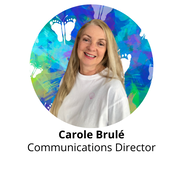
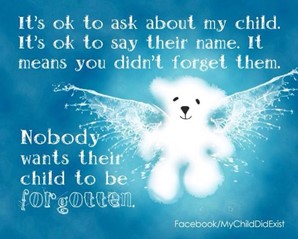
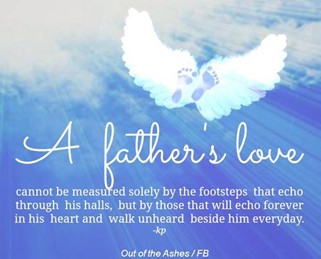

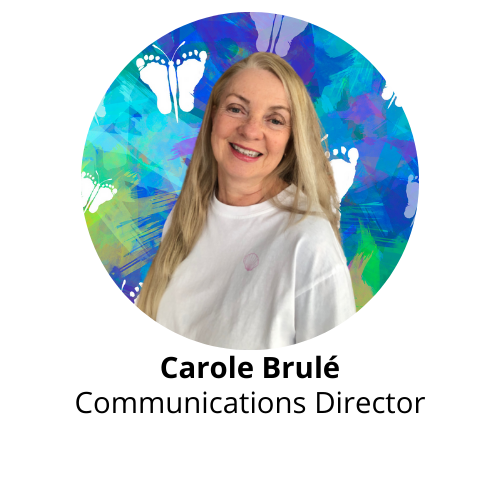

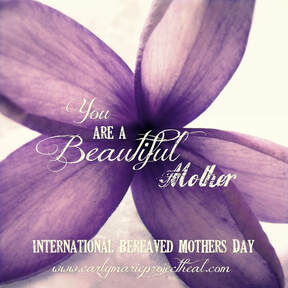
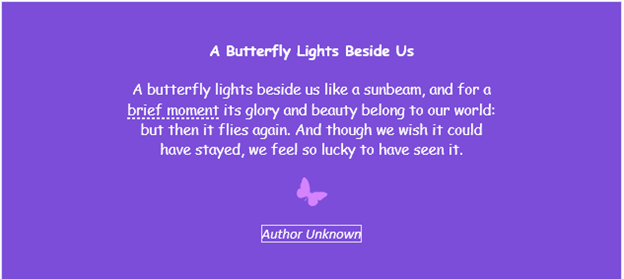




 RSS Feed
RSS Feed